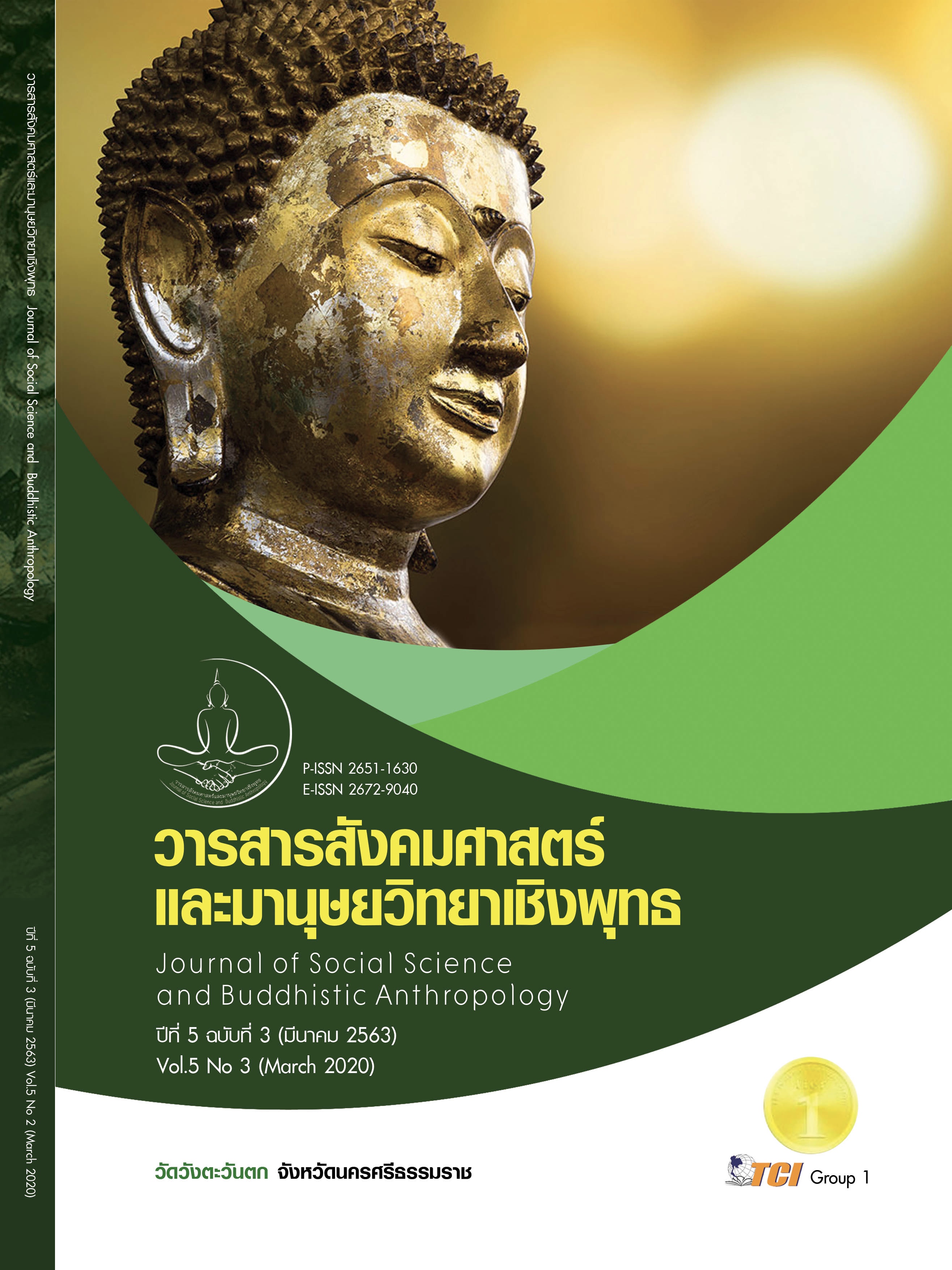THE EFFECTS OF SELF-DEVELOPMENT ACTIVITIES FOR BUDDHISM HOLISTIC WELL BEING OF YOUTHS IN LEARNING CENTER OF BUDDHISM AND SOCIAL DEVELOPMENT OF WAT SUTHIWARARAM
Keywords:
Youths, Self-Development, Buddhism Holistic Well BeingAbstract
The purpose of this article was to present the effects of self-development activities for Buddhism holistic well-being of youths. A quasi - experimental research method and non-randomized control-group pretest-posttest design were used in this study. The sample were 128 Mathayom 4 students who joined in moral camp of learning center of Buddhism and social development of Wat Suthiwarara. The sample were selected by purposive sampling from 128 applicants for the project which divided into 2 groups with 64 students in experimental groups and 64 students in control group. The study was conducted by organizing 10 training activities for 2 days 1 night and following up after 1 month of participation. The experimental group received training on the activity sets that designed by the researcher and the control group performed normal activities. Instruments used to collect data were self-development activities module, questionnaires of self-development and participatory behavioral observation form. Data were statically analyzed through percentage, mean, standard deviation and hypotheses were tested with t-test and one way ANOVA. The result found that average score of self - development for Buddhism holistic well-being enhancing of the experimental group were higher than before participating in the activities, after participation in activities and follow-up period and there were statistically significant differences at the .05 level (F = 68.661 ***, p-value = .000). The pair comparison found that, the average score of self- development after participating in the activities was higher than before participating in activities. (The average score was 3.32 and 2.89) and the follow-up period has average score of self-development higher than after participation in activities. (The average scores were 3.52 and 3.32) respectively. The pair comparison of the average score of self- development in control group found that there was no difference.
References
กมลาศ ภูวชนาธิพงศ์และคณะ. (2560). ค่านิยมและพฤติกรรมต้นแบบการใช้เครือข่ายสังคมออนไลน์ตามแนวพุทธจิตวิทยาบูรณาการของสามเณร. วารสารสันติศึกษาปริทรรศน์ มจร, 5(2), 40-55.
ชัยวัฒน์ สุรวิชัย. (2563). บวร:บ้านวัดโรงเรียน สร้างชีวิตจิตใจให้เข้มแข็งมีพลังสร้างสรรค์ ด้วยความรู้สติปัญญาและความจริง. เรียกใช้เมื่อ 15 มกราคม 2563 จาก https://siamrath.co.th/n/19811
พระพรหมคุณาภรณ์, (ป.อ.ปยุตฺโต). (2542). การศึกษาเพื่อสร้างบัณฑิตหรือการศึกษาเพื่อเพิ่มผลผลิต. กรุงเทพมหานคร: มูลนิธิพุทธธรรม.
พระพรหมคุณาภรณ์, (ป.อ.ปยุตฺโต). (2550). การพัฒนาที่ยั่งยืน. กรุงเทพมหานคร: บริษัทสหธรรมิก จำกัด.
พระพรหมคุณาภรณ์, (ป.อ.ปยุตฺโต). (2551). จะพัฒนาคนกันได้อย่างไร. กรุงเทพมหานคร: มูลนิธิพุทธธรรม.
พระพรหมคุณาภรณ์, (ป.อ.ปยุตฺโต). (2551). พุทธวิธีแก้ปัญหา เพื่อศตวรรษที่ 21. นครปฐม: สำนักพิมพ์ผลิธัมม์.
พระพรหมคุณาภรณ์, (ป.อ.ปยุตฺโต). (2556). โยนิโสมนสิการ:วิธีคิดตามหลักพุทธธรรม. กรุงเทพมหานคร: ปัญญาประดิษฐาน.
พระพรหมคุณาภรณ์, (ป.อ.ปยุตฺโต). (2559). การเสริมสร้างคุณลักษณะเด็กไทย. กรุงเทพมหานคร: เจริญดีมั่นคงการพิมพ์.
พระมหานันทวิทย์ ธีรภทฺโท. (2562). การจัดการเรียนรู้สู่ความพอเพียงตามหลักพุทธจิตวิทยาสำหรับนักเรียน ช่วงชั้นที่4. วารสารสันติศึกษาปริทรรศน์ มจร, 7(3), 800.
พระมหาสุทิตย์ อาภากโร (อบอุ่น)และคณะ. (2559). การสร้างและพัฒนาตัวชี้วัดความสุขของประชาชนตามหลักคำสอนของพระพุทธศาสนา. พระนครศรีอยุทธยา: สถาบันวิจัยวิจัยสถาบันวิจัยพุทธศาสตร์ มหาวิทยาลัยมหาจุฬาลงกรณราชวิทยาลัย.
พระราชปริยัติกวี, ศ.ดร. (2562). การวิจัยและนวัตกรรมเพื่อการพัฒนาจิตใจและสังคมอย่างยั่งยืนในยุค Thailand 4.0. ใน คำกล่าวเปิดเปิดงานวันคล้ายวันก่อตั้งวิทยาลัยสงฆ์นครน่าน และการจัดประชุมวิชาการระดับชาติ ครั้งที่ 2 MCU Nan Congress II . มหาวิทยาลัยมหาจุฬาลงกรณราชวิทยาลัย.
พระสำราญ ปภสฺสโร (สามเพชรเจริญ) และอำนาจ บัวศิริ. (2559). การพัฒนาคุณธรรมเยาวชนรุ่นใหม่. วารสารครุศาสตร์ปริทรรศน์, 3(3), 133-142.
รศ.ดร. พระสุธีรัตนบัณฑิต. (21 มกราคม 2562). ผลการใช้กิจกรรมการพัฒนาตนเพื่อเสริมสร้างสุขชีวีวิถีพุทธสำหรับเยาวชนในศูนย์การเรียนรู้พระพุทธศาสนาและการพัฒนาสังคม วัดสุทธิวราราม. (กมลาศ ภูวชนาธิพงศ์, ผู้สัมภาษณ์)
ศิรินันท์ กิตติสุขสถิตและคณะ. (2555). คู่มือวัดความสุขด้วยตัวเอง. กรุงเทพมหานคร: โรงพิมพ์ธรรมดาเพรส จำกัด.
สมโภชน์ เอี่ยมสุภาษิต. (2550). ทฤษฎีและเทคนิคการปรับพฤติกรรม. กรุงเทพมหานคร: จุฬาลงกรณ์มหาวิทยาลัย.
สิริอร วิชชาวุธ. (2554). จิตวิทยาการเรียนรู้. กรุงเทพมหานคร: สำนักพิมพ์มหาวิทยาลัยธรรมศาสตร์.
สุเทพ ชิตยวงษ์. (2562). เด็กมีปัญหาสุขภาพจิตเยอะ สพฐ. ตื่นตัว จัดระบบดูแลจิตใจ ในโรงเรียนอย่างจริงจัง หลังพบตัวเลขเด็กโทร.ปรึกษาสายด่วนสุขภาพจิตอื้อ. เรียกใช้เมื่อ 22 มกราคม 2562 จาก https://www.thaipost.net/main/detail/0000043866
Bandura, Albert. (1986). Social foundations of thought and action: A social cognitive theory Englewood Cliffs. New Jersey: Prentice-Hall.
Dusek,B.J. (1987). Adolescent development and behavior. New Jersey: Prentice Hall.









